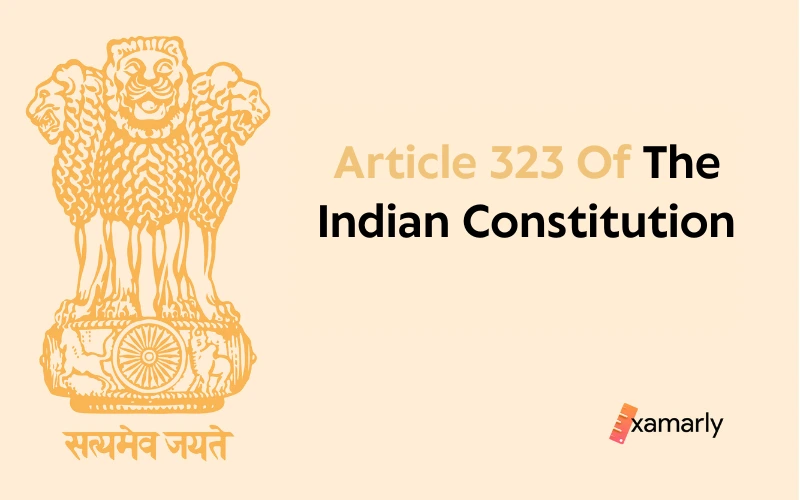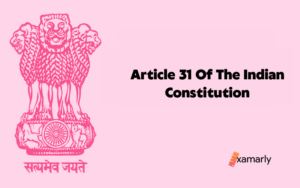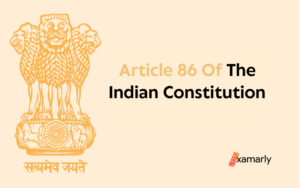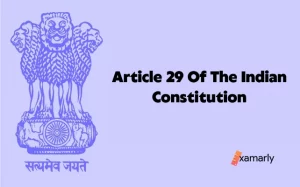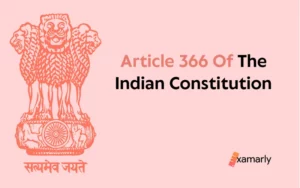Article 323 of the Indian Constitution is a provision that deals with the reports of Public Service Commissions, and is contained in Part XIV of the Constitution, which is titled “Services Under the Union and the States”.
This page covers Articles 323, 323A, and 323B of the Constitution of India and will help the candidates in their UPSC preparation as these Articles are covered under the Indian Polity IAS Syllabus.
- What Is Article 323 of the Indian Constitution?
- Article 323A Of The Indian Constitution
- Features Of Article 323 A
- Article 323B Of The Indian Constitution
- Difference Between Article 323A And 323B
- Winding UP
- FAQs On Article 232
- What Is Article 323 All About?
- When Was The Addition Of Article 323A Made?
- Which Article Of The Constitution Of India Deals With The Tribunal?
- What Is Article 323B?
- What Is The Difference Between A Tribunal And A Court?
- Why Are Tribunals Essential?
- What Is Article 136 Of The Indian Constitution?
- What Is Article 371D Of The Constitution Of India?
- What Are The Features Of Administrative Tribunals?
What Is Article 323 of the Indian Constitution?
The reports of Public Service Commissions are covered by Article 323 of the Indian Constitution. Its provisions are covered in the following two clauses:
- The Union Commission must be required to submit an annual report to the President outlining the work that the Commission has accomplished, and upon receipt of the report, the President shall cause a copy of it to be laid before each House of Parliament together with a memorandum explaining the circumstances, if any, in which the Commission’s recommendation was not accepted and stating the reasons wherefore.
- A State Commission is required to yearly give a report to the Governor of the State regarding the work it has completed, and a Joint Commission is required to annually provide a report to the Governor of each State whose needs the Joint Commission meets regarding the work it has completed with regard to that State. And in either scenario, the Governor is obligated, upon receipt of such a report, to ensure that a copy of it, along with a memorandum detailing the circumstances surrounding any instances in which the advice of the Commission was rejected and the reasons for such rejection, is presented to the legislature of the state.
Note: Article 323 of the Constitution of Indian was amended by the 7th constitutional amendment of this Constitution.
Also See: All About UPSC Exam: A Comprehensive Guide
Article 323A Of The Indian Constitution
Administrative tribunals are covered by Article 323 A. The constitutional provisions of Article 323A are contained in the following 3 clauses and sub-clauses:
- Disputes and complaints with respect to recruitment and conditions of service of persons appointed to public positions and posts in connection with the affairs of the Union or of any State or of any local or other authority within the territory of India or under the jurisdiction of the Government of India or of any company owned or controlled by the Government may be adjudicated or tried by administrative tribunals under laws that may be passed by Parliament.
- A law passed pursuant to clause (1) may:
- (a) allow for the formation of an administrative tribunal for the Union and distinct administrative tribunals for each State or for two or more States;
- (b) describe the jurisdiction, powers (including the right to penalize for contempt), and authority which may be employed by each of the stated tribunals;
- (c) stipulate the procedure (containing provisions as to limitation and rules of evidence) that is to be followed by the abovementioned tribunals;
- (d) exclude the jurisdiction of all courts, save the jurisdiction that the Supreme Court has pursuant to article 136 of the constitution of India, with regard to the disputes or complaints mentioned in clause (1);
- (e) provide for the transfer to each administrative tribunal of any cases that were pending before any court or other authority immediately prior to the formation of the tribunal and that would have fallen under its purview if the causes of action supporting the suits or proceedings had arisen following the establishment of the tribunal;
- (f) revoke or amend any order made by the President in accordance with clause (3) of article 371D;
- (g) contain such supplemental, incidental, and consequential provisions (including rules regarding fees) as Parliament may consider essential for the efficient operation of, and for the prompt disposition of cases by, and the execution of the orders of, such tribunals.
- Notwithstanding anything else that may be stated in any other provision of this Constitution or any other law that is presently in effect, the provisions of this article shall be given effect in accordance with their terms.
Note: Articles 323A and 323B are covered in Part XIVA of the Constitution of India titled “Tribunals.” The 42nd Amendment Act of 1976 introduced the said Part into the Constitution.
Features Of Article 323 A
- To put it succinctly, administrative tribunals are quasi-judicial entities (similar to the processes used in court), and their primary function is to settle disputes affecting the employment and service requirements of those who work for the government. Article 323A laid the foundation for the creation of the Central Administrative Tribunal, or CAT.
- Only the Parliament has the authority to appoint these public service tribunals, which are reflected in the framework of Article 323 A of the Constitution. Article 323 A stipulates that there can be only one tribunal chosen to preside over the Center, as well as one for each state, or two or more states together.
- The hierarchy of tribunals is not being investigated.
- The Tribunals were established to reduce the workload for the courts, speed up the decision-making process, and offer a discussion that would be run by lawyers in the areas covered by the jurisdiction.
Article 323B Of The Indian Constitution
The tribunals for other matters are covered within Article 323B. The constitutional provisions of the said Article are contained below in the 4 clauses and sub-clauses:
- The appropriate Legislature may pass legislation allowing for the adjudication or trial by tribunals of any disputes, complaints, or offenses involving all or any of the subjects listed in clause (2) for which such Legislature has the authority to create laws.
- The following are the matters listed in clause (1), specifically:—
- (a) levy, assessment, collection, and enforcement of any tax;
- (b) foreign exchange, import, and export across customs frontiers;
- (c) industrial as well as labour disputes;
- (d) land reforms through the State acquiring any estate as specified in article 31A or any rights therein, or through the extinction or modification of any such rights, or through the imposition of a ceiling on agricultural land, or in any other manner;
- (e) the cap on the urban property;
- (f) elections to either House of Parliament or the House or either House of the Legislature of a State, but leaving out the subjects that are mentioned in articles 329 and 329A;
- (g) production, procurement, supply, and circulation of foodstuffs (including edible oilseeds and oils) and other products the President may announce to be essential for the objectives of this article by public notification, as well as control over the prices of such products;
- (h) rent, it’s regulation and control, and tenancy issues, such as landlords’ and tenants’ rights, titles, and interests.
- (i) offences against laws with regard to any of the matters stated in subclauses (a) to (h), as well as fees with regard to any of those matters.
- (j) any matter incidental to any of the matters listed in subclauses (a) to (i).
- A law made pursuant to clause (1) may—
- (a) include provisions for the formation of a hierarchy of tribunals;
- (b) define the jurisdiction, powers (including the right to punish for contempt), and authority that may be implemented by each of the aforementioned tribunals;
- (c) specify the procedure (including limitations and rules of evidence) to be undertaken by the aforementioned tribunals;
- (d) exclude the jurisdiction of all courts, save the Supreme Court’s jurisdiction under article 136, with connection to all or any of the topics within the purview of the aforementioned tribunals;
- (e) provide for the transfer to each of these tribunals of any cases that were pending before any court or other authority instantly prior to the formation of each such tribunal and that would have fallen under its purview if the causes of action supporting such suits or proceedings had arisen following such formation;
- (f) contain such additional, incidental, and consequential provisions (containing provisions regarding fees) as the appropriate Legislature may consider essential for the effective functioning of, the speedy disposal of cases by, and the enforcement of the decisions of, such tribunals.
- The provisions of this article shall be applicable regardless of any other provisions in the Constitution or other laws currently in force.
Explanation.—In this article, “appropriate Legislature” refers to Parliament or, if applicable, a State Legislature that is competent to create laws regarding any topic in line with the provisions of Part XI.
Difference Between Article 323A And 323B
- In contrast to 323A, which deals with administrative tribunals, 323B is concerned with various kinds of tribunals, including the National Green Tribunal, the Competition Appellate Tribunal (COMPAT), the Securities Appellate Tribunal (SAT), etc.
- Only the Parliament may create tribunals under article 323A. However, the State Legislature, as well as the Parliament, can both constitute tribunals under Article 323B.
- A hierarchy of tribunals is permitted under 323B as opposed to 323A, which permits just one central tribunal and one for each state (or for two or more states).
Winding UP
Article 323 is an important provision that sets out the legal framework for the functioning of Public Service Commissions in India. It ensures that the reports of these commissions are made available to the President or the Governor, and are laid before the Parliament or the legislature of the State, as the case may be. This helps to ensure that the recommendations of the Public Service Commissions are properly considered, and that appropriate action is taken on the basis of these recommendations.
For Further Readings:
| Article 313 Of The Indian Constitution: Transitional Provisions | Article 394 of the Indian Constitution |
| Article 395 of the Indian Constitution: Repeals | Article 283 Of The Indian Constitution |
FAQs On Article 232
What Is Article 323 All About?
According to Article 323, the reports of Public Service Commissions shall be made to the President in the case of the Union Public Service Commission, and to the Governor in the case of a State Public Service Commission. The article also specifies that the President or the Governor, as the case may be, shall cause all such reports to be laid before the Parliament or the legislature of the State, as the case may be, and shall take such action as he thinks fit on the basis of the recommendations contained in the reports.
When Was The Addition Of Article 323A Made?
By way of the 42nd Amendment Act of 1976, Article 323A was inserted into the Constitution. The decentralization of legal actions was supposed to fulfill the function of ensuring timely decision-making.
Which Article Of The Constitution Of India Deals With The Tribunal?
The 42nd Amendment Act, passed in 1976, added tribunals to the Indian Constitution, which did not originally include them.
1. Administrative Tribunals are covered by Article 323-A.
2. Tribunals for other cases are covered by Article 323-B.
What Is Article 323B?
The establishment of tribunals for the resolution of disputes concerning the following subjects is permitted by Article 323 B, and it may be done by the Parliament as well as state legislatures:
a. Foodstuff
b. Land reforms
c. Taxation
d.Cap on urban property
e. Rent as well as tenancy rights
f. Foreign exchange, import, and export
g. Elections to Parliament and state legislatures
h. Disputes regarding industrial as well as labour
What Is The Difference Between A Tribunal And A Court?
Traditional courts are a component of the judicial system. The administrative tribunal is a body established by statute and given judicial authority. All subjects fall under the general jurisdiction of a court of law whereas the administrative tribunal has limited authority to decide a specific issue and deals with service-related matters.
Why Are Tribunals Essential?
Tribunals are crucial because they give affected parties the means to resolve issues quickly and inexpensively. In addition to this, they alleviate some of the pressure placed on the regular courts.
What Is Article 136 Of The Indian Constitution?
The Supreme Court’s special leave to appeal is governed under Article 136 of the Indian Constitution.
What Is Article 371D Of The Constitution Of India?
The special provisions with regard to the States of Andhra Pradesh or Telangana are covered by Article 371D of the Indian Constitution.
What Are The Features Of Administrative Tribunals?
1. A statute was used to create the Administrative Tribunal.
2. The Administrative Tribunal is required to respect natural justice standards and function in a legal manner.
3. The stringent requirements of procedure and facts set forth by the civil procedure court are not applicable to an administrative tribunal.


